|
Outline of Presentation
n
Tamil Eelam Struggle for Freedom
n
The International Frame - Some Aspects
A Presentation by
www.tamilnation.org
3 September 2007
n
Struggle for Tamil Eelam is a National Question
… and
it is therefore an Inter – National Question
n
The Struggle of Tamil Eelam for freedom is lawful & just
"Throughout the ages the Sinhalese and Tamils in the country
lived as distinct sovereign people till they were brought under
foreign domination.. We have for the last 25 years made every effort
to secure our political rights on the basis of equality with the
Sinhalese in a united Ceylon. It is a regrettable fact that
successive Sinhalese governments have used the(ir) power …to deny us
our fundamental rights and reduce us to the position of a subject
people…I wish to announce to my people and to the country that I
consider the verdict at this election as a mandate that the Tamil
Eelam nation should exercise the sovereignty already vested in the
Tamil people and become free." -
Statement by Gandhian Tamil Leader S.J.V.Chelvanayagam Q.C. M.P. 7
February 1975
n
The Struggle of Tamil Eelam for freedom is lawful & just
…because democracy means the rule of the people, by the people,
for the people and therefore, no one people may rule another; and
…because the struggle of the people of Tamil Eelam is about
securing freedom from alien Sinhala rule…
n
Sinhala rule is alien rule …
… because the Sinhala people speak a different language to that
of the Tamil people; because they trace their history to origins
different from that of the Tamil people; and because their cultural
heritage is different to that of the Tamil people.
n
…it is alien Sinhala rule
… because
the political consciousness of the Sinhala people and the way
they exercise their vote, is clearly determined by their separate
language, by their separate history and by their separate cultural
heritage - in short by their own separate Sinhala national identity
n
…it is alien Sinhala rule
… because no Tamil has ever been elected to an electorate which
had a majority of Sinhala voters and no Sinhalese has ever been
elected to an electorate which had a majority of Tamil voters; and
…because a Sinhala Buddhist ethno nation masquerading as a civic ' multi ethnic
Sri Lankan nation', will always have a Sinhala Buddhist as the executive
head of government.
n ...it is alien Sinhala rule
…
…because the
record proves and proves beyond any reasonable doubt
that the practise of democracy within the confines of a single
state has resulted in genocidal rule by a permanent Sinhala
majority…
n The charge is genocide – the
struggle is for freedom …
“…Communal riots in which Tamils are killed, maimed, robbed and
rendered homeless are no longer isolated episodes; they are
beginning to become a pernicious habit."
Paul
Sieghart , International Commission of Jurists and British Section,
Justice, March 1984 [see
1956,
1958,
1961,
1974,1977,
1983]
n “Secession/partition of the two
communities is the best outcome overall” …
"...The problem in nationally divided societies is that the
different groups have different political identities, and, in cases
where the identities are mutually exclusive (not nested), these
groups see themselves as forming distinct political communities. ..
if the minority group seeks to be self-governing, or to secede from
the larger state, increased representation at the centre will not be
satisfactory. The problem in this case is that the group does not
identify with the centre, or want to be part of that political
community...One conclusion that can be drawn is that…
secession/partition of the two communities, where that option is
available, is the best outcome overall. .."
Normative Justifications for Liberal Nationalism - Margaret Moore,
2001
n Inviolability of borders against
outside invasion must be separated from right to statehood of a people
within a state's borders…
“… the principle of territorial integrity protects a state only
against invasion of its borders and not against internal
rebellion... Lord Robert Cecil once justly observed that the main
cause of recurrence of wars was precisely the permanent freezing of
state frontiers. In a recent New York Times article, human rights
activist Yelena Bonner (widow of Andrei Sakharov) writes that "the
inviolability of a country's borders against invasion from the
outside must be clearly separated from the right to statehood of any
people within a state's borders."
Visuvanathan Rudrakumaran in The Tamils' Quest for Statehood 1992
n
Restrictions on self-determination threaten democracy…
“... Restrictions on self-determination threaten not only
democracy itself but the state which seeks its legitimation in
democracy...Let us accept the fact that states have lifecycles
similar to those of human beings who created them. … hardly any
Member State of the United Nations has existed within its present
borders for longer than five generations. The attempt to freeze
human evolution has in the past been a futile undertaking…"
Self Determination & the Future of Democracy - Prince Hans-Adam II
of Liechtenstein, 2001
n Legal scholars and non-governmental
organizations have been vocal in their support for the right to self
determination of the people of Tamil Eelam…
"We request that the delegates to the 49th Session of the
Commission on Human Rights.. accord open recognition to the
existence of the Tamil homeland in the North and East of the Island;
and recognise that the Tamil population in the North and East of the
island constitute a 'people' with the right to self determination'‘
Joint Statement by 15 NGOs consisting of the International
Organisation for the Elimination of all Forms of Racial
Discrimination, International Educational Development, Centre Europe
Ties Monde, International Indian Treaty Council, Fedefam,
Association paur la Liberte Religiose, Codehuca, World Christian
Community, Pax Christie International, International League for the
Rights and Liberation of Peoples, Movement contra le Racisme,
International Association of Educadores for World Peace,
International Association against Torture, World Confederation of
Labour, and International Movement for Fraternal Union among Races
and Peoples.
at United Nations Commission on Human Rights, Geneva 8 February 1993
n
…in sum, the Struggle of Tamil Eelam for freedom is lawful & just
…because it is about the democratic right of the people of Tamil
Eelam to govern themselves in their homeland… and ....because it
is
about reversion of sovereignty - a sovereignty that the Tamil
people enjoyed before the British unified the administration of the
island of Sri Lanka in 1833.
n but… the world is not rotating
on the axis of law & justice…
“The world is not rotating on the axis of justice…It is economic
and trade interests that determine the order of the present world,
not the moral law of justice nor the rights of people… International
relations and diplomacy between countries are determined by such
interests..”–
Velupillai Pirabakaran, Leader of Tamil Eelam, November 1993
n
…and inter-state relations are not governed by the logic of morality
"Inter-state relations are not governed by the logic of morality.
They were and they remain an amoral phenomenon.."
Jyotindra Nath
Dixit Indian Foreign Secretary in 1991/94 and National Security
Adviser to the Prime Minister of India 2004/05, speaking in
Switzerland, February 1998
"We have no eternal allies and we have no perpetual enemies. Our
interests are eternal and perpetual, and those interests it is our
duty to follow." British Foreign Secretary,
Lord Palmerston (1784-1865) - 150 years ago
n
…inter-state relations are governed by realpolitik…
'‘…When governments pretend not to notice suffering, to whom can
peoples.. turn for help? The United Nations? Alas, the deeper you
delve, the redder the faces. The cynicism of realpolitik extends
even to the UN Commission on Human Rights... When Amnesty attended
the Commission in Geneva last month to urge action on Indonesia and
East Timor, we met only embarrassment. The governments to which we
spoke repeated what they have been promising us for thirty years:
they will pursue a policy of 'quiet diplomacy''' Amnesty in a
full page advertisement in the London based Guardian on 12 March
1994 quoted in
Cynicism of Real Politick, Nadesan Satyendra, March 1994
n
…the cynicism of real politik which led US to declare in May 2000…
“…As I have said in both India and Pakistan, the U.S. does not
envision or support the establishment of another independent state
on this island, nor do we believe other members of the international
community would support it.”
US Under Secretary
of State, Thomas R. Pickering Press Conference, Colombo, Sri
Lanka, 29 May 2000
n
…a cynicism which led the Massachusetts House of Representatives to resolve
in June 1981…
“..Resolved, that the Massachusetts House of Representatives
hereby urges the President and the Congress of the United States to
support the Struggle for Freedom by the Tamil Nation for the
Restoration and Reconstitution of the separate sovereign state of
Tamil Eelam and to recognise publicly the right of self
determination by the Tamil people of Tamil Eelam"
House of
Representatives Resolution, the Commonwealth of Massachusetts, USA,
18 June 1981
n …a cynicism which led India to
train Tamil militants in the 1980s…
"...Most Tamil separatists from Sri Lanka had accepted the Indian
offer (to provide arms and training) at its face value, thinking
that New Delhi was reaching out to them out of genuine concern for
their condition. However, an extraordinary revelation began to
unfold as the training started. Many guerrillas realized that the
training was just a subterfuge for a larger strategic game that
India was attempting to play, a game in which the Tamil rebels may
end up being just expendable pawns…”
Narayan Swamy, M.R. - Inside an Elusive Mind - Prabhakaran
Published by Literate World, Inc, USA, 2003
n … a cynicism which seeks cover as
‘disinterested’ good Samaritans…
The ‘international community’ are not “disinterested” good
Samaritans concerned primarily with securing justice for the Tamil
people and bringing peace to a troubled island.… The actions of the
Trilaterals (US, EU, Japan) on the one hand and India & China on the
other hand, are directed to stabilise Sri Lanka in such a way so as
to advance each of their own (conflicting) strategic interests in
relation to the uneasy balance of power that prevails in the Indian
Ocean Region.
n
…the prevailing uneasy Balance of Power in the Indian Ocean Region…
“The dynamics of the region .. call for a balance of power
approach rather than a straight alliance. ..”
Adam Wolfe, Yevgeny Bendersky, Dr. Federico Bordonaro - India's
Project Seabird and Indian Ocean's Balance of Power, PINR, 20 July
2005
n
… the uneasy balance of power in the Indian Ocean region has impacted
on the Tamil Eelam Struggle for Freedom…
Here, two frames may be usefully looked at…
One… the Strategic
Significance of the
Indian Ocean Region, and
Two… the Strategic Significance of Sri Lanka in the Indian Ocean
Region
Let us examine each in turn…
n One… the Strategic Significance of the
Indian Ocean Region
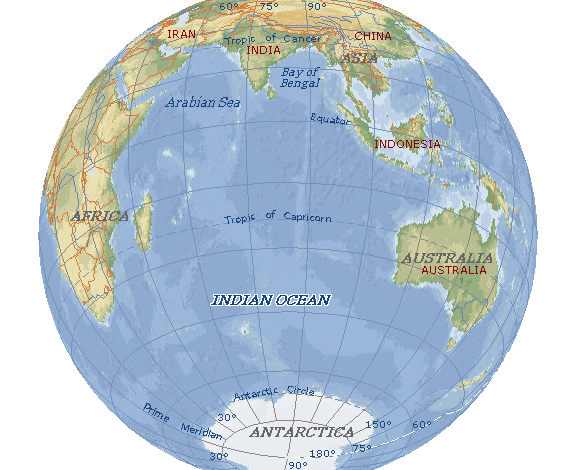
The Indian Ocean is nearly 6,000 miles wide at the southern tips
of Africa and Australia and its area is 2.8 million square miles,
about 5.5 times the size of the US. The Indian peninsula projects
1240 miles into the Indian Ocean. 50% of the Indian Ocean basin lies
within a 1,000 mile radius of India. 47 countries have the Indian
Ocean on their shores.
n
… a Strategic Significance which Germany recognised in World War II
" ...Next to nothing has been written about the U-boat war in the
Indian Ocean… The battle began in August 1943, when a German
submarine arrived in the Malaysian harbour of Georgetown. In total,
nearly fourty U-boats were assigned to penetrate the Indian Ocean,
serving alongside troops of the occupying Imperial Japanese
forces..."
Lawrence Paterson - Hitler's Grey Wolves: U-Boats in the Indian
Ocean
n
Today… the Indian Ocean remains a Critical Waterway
The Indian Ocean is a critical waterway for global trade and
commerce… thro’ which passes half of the world’s containerized
cargo, one third of its bulk cargo and two third of its oil
shipment. Its waters carry heavy traffic of petroleum and petroleum
products from the oilfields of the Persian Gulf and Indonesia, and
contain an estimated 40% of the world's offshore oil production...
n The Sea Lanes of the Indian Ocean
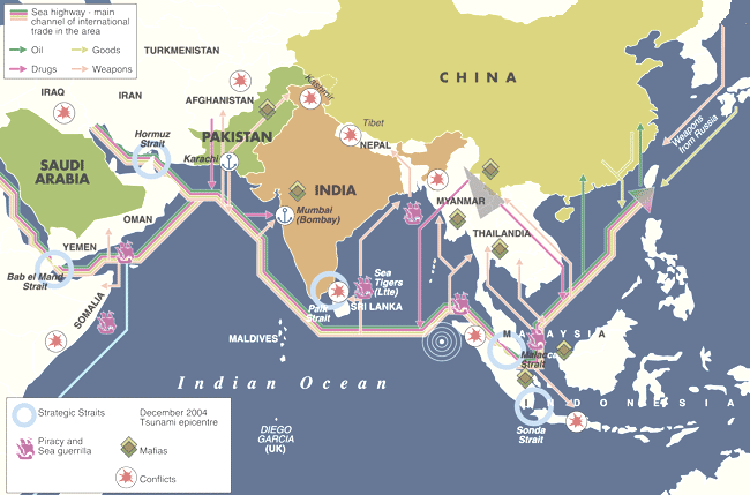
n
… in the 21st Century the destiny of the world will be decided in these
waters…
“…Whoever controls the Indian Ocean dominates Asia. This ocean is
the key to the seven seas in the twenty-first century, the destiny
of the world will be decided in these waters." US Rear Admiral
Alfred Thayer Mahan quoted by
Cdr. P K Ghosh in Maritime Security Challenges in South Asia and the
Indian Ocean, 18 January 2004
n
Critical Choke Points of the Indian Ocean
“… The Ocean features four critically important access waterways
facilitating international maritime trade - the Suez Canal in Egypt,
Bab-el-Mandeb (bordering Djibouti and Yemen), Straits of Hormuz
(bordering Iran and Oman), and Straits of Malacca (bordering
Indonesia and Malaysia). These “chokepoints” or narrow channels are
critical to world oil trade as huge amounts of oil pass through
them."
The role of the Indian Ocean in Facilitating Global Maritime Trade,
Nazery Khalid, June 2005
n
80% of Japan’s & 60% of China’s Oil shipped through Malacca Straits
Oil-tanker traffic through the narrow strait, which already
carries most of North Asia's oil imports, is projected to grow from
10 million barrels a day in 2002 to 20 million barrels a day in 2020
- much of that oil will be destined for the fast-growing market of
China.
“ 80% of Japan’s oil supplies and 60% of China’s oil supplies are
shipped through the Straits of Malacca. US$ 70 billion worth of oil
passes through the straits each year.”
India,
the Indian Ocean and Geo-politics Posted on 06.12.06 by Jaffna in
the Indian National Interest
n
US, India & China: Strategic Interest in Malacca Straits & Andaman Sea…
"In recent years, in addition to the US, whose navy has long had
a presence in the Indian Ocean and has been stealthily sailing the
waters of the Bay of Bengal, China has also shown a considerable
interest in utilizing the Andaman Sea as an outlet to the Indian
Ocean in the near future. India bids to rule the waves." Ramtanu
Maitra, 19 October 2005, Asia Times
n
China & India scrambling for advantage in the Indian Ocean Region
“… Let this be clear: the two major powers of the region, China
and India, are scrambling for advantage around the Indian Ocean's
rim. China is building military and naval links with Bangladesh and
Myanmar. The cooperation between China and African countries is now
getting more and more visible, particularly after the China-Africa
summit in Beijing in November 2006... Reports available indicate
that both India and the United States are studying intensely this
rise in Chinese activity."
Atul
Dev on The Indian Ocean: Current Security Environment, 25 May 2007
n Indian Ocean Strategic Landscape is being
transformed…
"…the emergence of new powers like China and India is expected to
transform the regional strategic landscape in a fashion that could
be as dramatic as the rise of Germany in the 19th century and the
United States in the 20th century"
Barry Desker, Director IDSS, Singapore in Maritime Balance of Power
in the Asia-Pacific - Report of a Conference Organised by the
Institute of Defence and Strategic Studies, Singapore, 8th – 9th
March 2005
n Indian Ocean Region has
become Strategic Heartland of 21st Century…
"…The Indian ocean region has become the strategic heartland of
the 21st century, dislodging Europe and North East Asia which
adorned this position in the 20th century.. the developments in the
Indian Ocean region are contributing to the advent of a less Western
centric and a more multi-polar world..."
Donald
L. Berlin, Asia Pacific Centre for Security Studies, Hawaii , 13
December 2006
n
Setting the Stage for a New Cold War...
"..China, which has been a net oil importer since 1993, is the
world's number two oil consumer after the U.S. and has accounted for
40 percent of the world's crude oil demand growth since 2000…China
is stepping up efforts to secure sea lanes and transport routes that
are vital for oil shipments .."
Setting
the Stage for a New Cold War: China's Quest for Energy Security -
PINR, 25 February 2005
n
US Strategic Interests in the Indian Ocean Region…
“US strategic interests in Sri Lanka are intertwined with its
military objectives in South Asia and Asia … Central to the US
strategic objective in Asia is the desire to “preclude the rise of a
regional or continental hegemon.” The US believes that no nation in
Asia poses such a threat to it at the moment. But it believes that
China, India and Iran have the potential to develop into continental
hegemons either on their own or as partners of regional coalitions
including Russia that could threaten US interests in Asia and, in
the long run, in the world.”
US Strategic Interests in Sri Lanka - Dharmaretnam Sivaram, 30 July
2005
n
Indian Ocean – US & Diego Garcia
“ The (US) base improvements will allow its new class of SSGN
nuclear submarines to operate from Diego Garcia.. the SSGNs.. carry
up to 154 Tactical Tomahawks, robot kamikaze jets which can be
remotely piloted to strike locations a thousand miles inland..."
US Navy builds Stingray-esque base in Indian Ocean - Frogmen,
mini-subs to operate from nuke motherships - Lewis Page, 7 April
2007
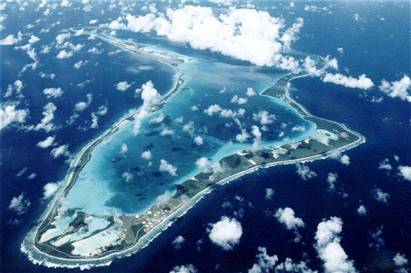 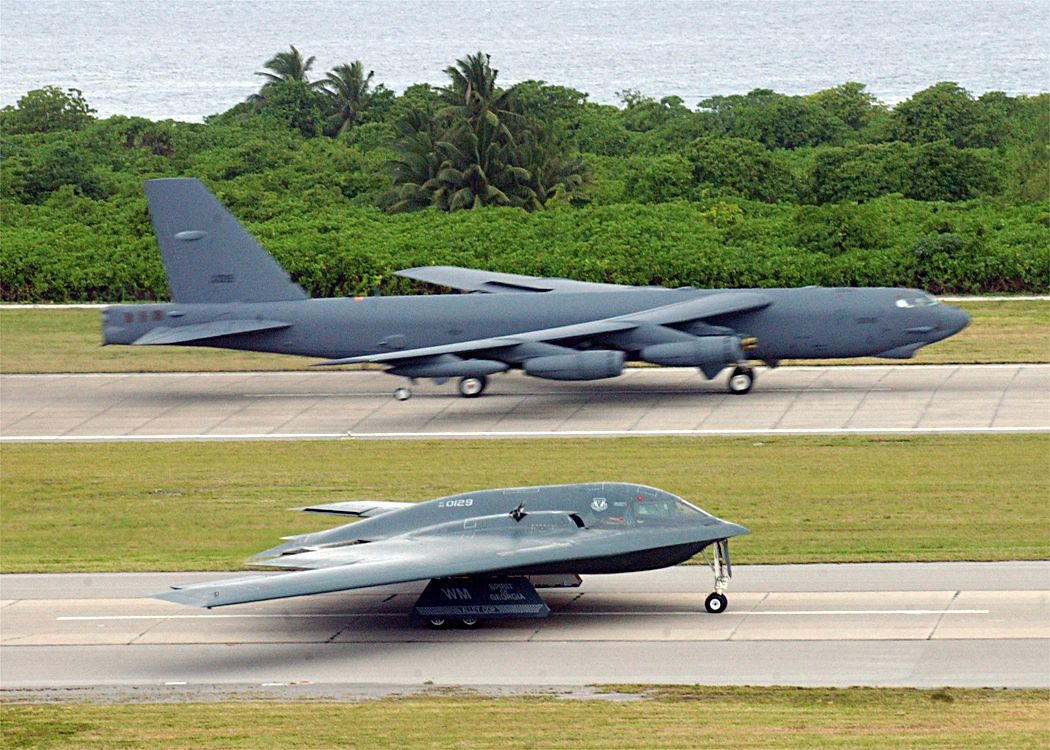
n
US – India: a Strategic Partnership or…
At the last meeting of the Indo-US Defence Joint Working Group
held in New Delhi (on 10 April 2007), China's 'growing naval
expansion in the Indian Ocean' was noted with concern. The meeting
also noted: ''China is rapidly increasing military and maritime
links with countries such as Myanmar, Bangladesh, Sri Lanka,
Maldives, Seychelles, Mauritius and Madagascar… The 200 years of the
Anglo-Saxon presence in the region has now been replaced by the
US-China presence to further and protect their interests. Isn’t it
time for the ‘owners’ of the Indian Ocean to get together to protect
their own interests? "
Atul
Dev in the Mauritius Times, 25 May 2007
n
or… an evolving entente… or…
"...Last April, at a two-day workshop at the Indian Defense
Studies Analysis (IDSA), a New Delhi-based think tank, discussions
took place on emerging U.S.-Indian strategic relations. One Indian
analyst pointed out that although Indians are eager to obtain U.S.
technology… Indians worry that at a crucial time they might not be
supplied with replacement parts if the relationship goes bad
again.... A senior Indian military official delivering a luncheon
address to the conference cautioned that Indo-U.S. relations .. can
be better described as an "evolving entente," and argued that given
its size, location, and ambitions, India will always march to the
beat of its own drummer..."Geostrategic
Import of the Coming Bay of Bengal Naval Exercise - Ramtanu Maitra,
Executive Intelligence Review, 27 July 2007
n
or… will India always try to march to the beat of its own drummer
"...In the current international landscape, there is only one
country which has a truly global agenda and also a global reach,
which is the United States. However, there is also a cluster of
major powers with strong regional profiles but increasingly global
impact. These include the E.U., Russia, China, Japan, India, Brazil
and South Africa. While U.S. pre-eminence is unlikely to be reversed
in the foreseeable future, the relative importance of the other
major powers is likely to increase. We are already in a world of
what I would call "asymmetric multipolarity" with the asymmetry
progressively diminishing over a period of time. India has an
instinctive preference for multipolarity… this is a trend which is
positive from India’s standpoint as an emerging power…”
Shyam Saran, Special Envoy to Indian Prime Minister, Indian
Foreign Secretary 2004 – 2006,
Address at the Institute for South Asian Studies, Singapore, 30
August 2007
n
India in Madagascar
“India is reportedly planning to set up a high-tech monitoring
station in northern Madagascar … It would be the first such facility
New Delhi has opened in another country.. India will pay US$2.5
million to lease the station, because it apprehends threats to its
strategic naval assets and its political, economic and military
interests in Africa..”
Delhi all ears in the Indian Ocean - Sudha Ramachandran in Asia
Times, 3 March 2006
n
China in Gawdor, Pakistan
"Four months after the U.S. ordered its troops into Afghanistan
to remove the Taliban regime, China and Pakistan joined hands to
break ground in building a Deep Sea Port in Gwador on the Arabian
Sea… Gwadar is nautically bounded by the Persian Gulf in the west
and the Gulf of Oman in the southwest “
China's Naval Outpost on the Indian Ocean, Tarique Niazi, The
Jamestown Foundation, 28 February 2005
n
Japan’s Indian Ocean Deployment...
"By most standards, Japan is now the world’s number two naval
power....the primary reason for dispatching the Kongo-class Aegis
ships (to the Indian Ocean) ...was... undoubtedly...to do with the
prodigious area-wide surveillance and tracking capacities of the
Aegis air defense system operated by the Kongo-class ships . These
would have enabled the MSDF ships to cooperate with both US and UK
navy and air units operating not only in the Indian Ocean, but
possibly over Afghanistan itself..."
Japan’s
Indian Ocean Naval Deployment: Blue water militarization in a
“normal country” - Richard Tanter in Japan Focus, 21 March 2006
n Stirling in Australia – de facto
US Base in the Indian Ocean
“… In late 2002 the Australian government agreed to allow the US
military to use the HMAS Stirling naval base in Cockburn Sound on
the west coast of Australia to trial its new “sea-swap” program. The
plan is aimed at boosting US naval firepower in the Indian Ocean and
Persian Gulf. Critics charge that the Australian Federal and State
Governments are working to make Cockburn Sound a defacto base for
the US navy.”
Stirling Naval Base at Global Security
n China calls for exclusion of
outside powers from the Indian Ocean…
At the UN Ad Hoc Committee on Indian Ocean, 451st Meeting (PM) on
26 July 2005 the representative of China "called for common efforts
for countries inside and outside the region to maintain peace and
stability in the region and to establish the Zone of Peace at an
early date. To that end, the major Powers outside the region should
eliminate their military presence in the Indian Ocean region."
Declaration of the Indian Ocean as a Zone of Peace
n
China’s Geo Political Strategy: “String of Pearls”
“The geopolitical strategy dubbed the “String of Pearls” is
arising as foreign oil becomes a center of gravity critical to
China’s energy needs. China’s rising maritime power is encountering
American maritime power along the sea lines of communication (SLOCs)
that connect China to vital energy resources in the Middle East and
Africa.”
“Each “pearl” in the “String of Pearls” is a nexus of Chinese
geopolitical influence or military presence. Hainan Island, with
recently upgraded military facilities, is a “pearl.” An upgraded
airstrip on Woody Island, located in the Paracel archipelago 300
nautical miles east of Vietnam, is a “pearl.” A container shipping
facility in Chittagong, Bangladesh, is a “pearl.” Construction of a
deep water port in Sittwe, Myanmar, is a “pearl,” as is the
construction of a navy base in Gwadar, Pakistan. … China is building
strategic relationships and developing a capability to establish a
forward presence along the sea lines of communication (SLOCs) that
connect China to the Middle East”
String of Pearls:Meeting the Challenge of China’s Rising Power
Across the Asian Littoral - Lt.Col. Christopher J. Pehrson, July,
2006
n
And now, let us turn to Sri Lanka’s Strategic Importance …
(1) Sri Lanka is strategically situated in the Indian Ocean
(2) It is ideally situated to be a major communication center,
and
(3) It has Trincomalee, described by the British Admiral Horatio
Nelson as “the finest harbour in the world”.
Ramesh Somasundaram of Deakin University quoted by P.K. Balachandran
in Hindustan Times, 30 May 2005
n
Sri Lanka’s Strategic Importance was recognised by UK in 1948
1948 Defence agreement with UK, essential prerequisite to
independence - “United Kingdom may base such naval and air forces
and maintain such land forces in Ceylon [as may be required for the
security of their territories, for defence against external
aggression], and as may be mutually agreed.”
Ceylon - United Kingdom Defence Agreement, 1948
n
Sri Lanka’s Strategic Importance was recognised by India in 1987
“Trincomalee or any other ports in Sri Lanka will not be made
available for military use by any country in a manner prejudicial to
India's interests. The work of restoring and operating the
Trincomalee Oil Tank will be undertaken as a joint operation between
India and Sri Lanka. Sri Lanka's agreement with foreign broadcasting
organisations will be reviewed to ensure that any facilities set up
by them in Sri Lanka are used solely as public broadcasting
facilities and not for any military or intelligence purposes.”
Exchange of Letters between India & Sri Lanka immediately preceding
the signing Indo - Sri Lanka Accord, 29 July 1987
n
… the Significance of Trincomalee…
“Trincomalee has immense significance in this age of nuclear weaponry and
nuclear submarine-based missile systems …
Given the depth of the harbour, nuclear submarines are able to
dive low within the inner harbour to effectively avoid radar and
sonar detection”
Ramesh Somasundaram of Deakin University quoted by P.K. Balachandran
in Hindustan Times, 30 May 2005
n
US Presence in Sri Lanka – a politico-strategic pressure point against India
in 1980s & today…
“The rise of Tamil militancy in Sri Lanka and the Jayawardene
government's serious apprehensions about this development were
utilised by the US and Pakistan to create a politico-strategic
pressure point against India, in the island's strategically
sensitive coast off the Peninsula of India. Jayawardene…established
substantive defensive and intelligence contacts with US, Pakistan
and Israel… Tamil militancy received support both from Tamil Nadu
and from the Central Government … also as a response to
Jayawardene's concrete and expanded military and intelligence
cooperation with the United States, Israel and Pakistan. The
assessment was that these presences would pose a strategic threat to
India..” Jyotindra Nath Dixit Indian Foreign Secretary in 1991/94
and National Security Adviser to the Prime Minister of India
2004/05, speaking
in Switzerland, February 1998
n
Sri Lanka: Another US Base in the Indian Ocean?
“The ten year Acquisition and Cross-Servicing Agreement (ACSA)
signed by the United States and Sri Lanka on March 5, which provides
for among other things logistics supplies and re-fuelling
facilities, has major ramifications for the region, particularly
India. For all the sophistry and spin by the Americans, the ACSA is
a military deal and, on the face of it, is loaded in Washington's
favour “
B. Muralidhar Reddy in Acquisition and Cross-Servicing Agreement &
the Indo Sri Lanka Accord 9 March 2007
n
But… former US Ambassador Lunstead says that US has no interests in military
bases in Sri Lanka…
“..With the end of the Cold War, U.S. interest in Sri Lanka
waned. As recently as 2000, the United States Agency for
International Development (USAID) was planning for significantly
reduced development assistance levels. The enhanced engagement that
commenced in 2001 occurred despite the absence of significant U.S.
strategic interests in Sri Lanka. Political-military interests are
not high, and the U.S. has no interest in military bases in Sri
Lanka. From an economic and commercial standpoint, Sri Lanka is
unlikely to be a major U.S. trading partner in the near future.
There is not a large enough Sri Lankan-origin community in the U.S.
to have an impact on U.S. domestic politics. “United
States Role in Sri Lanka Peace Process 2002-2006, Jeffrey Lunstead,
15 May 2007
n The Cynicism of Real Politick…
Ambassadors are honest men sent abroad to lie for their country?
Like humans, countries also lie…
Because they want to cover up the real reasons for their actions
n
Because the real reasons will not stand up to public scrutiny, and
governments risk losing the support of their own voters within their own country…
n
Therefore, in Iraq the lie was ‘Weapons of Mass Destruction’…
America, America, American War Paar Ada! -
Audio
Video Presentation
n
… and in Sri Lanka the lie is Terrorism…
“..The main U.S. strategic interest in Sri Lanka is in ensuring
that a terrorist organization does not obtain its goals through the
use of terror…”
United States Role in Sri Lanka Peace Process 2002-2006, Jeffrey
Lunstead, 15 May 2007
n
But what is Terrorism?
 'When
I use a word,' Humpty Dumpty said in a rather scornful tone, 'it
means just what I choose it to mean, neither more nor less'. 'The
question is,' said Alice, 'whether you can make words mean so many
different things'. 'The question is,' said Humpty Dumpty, 'which is
to be master - that's all'." Alice in Wonderland, Lewis Carrol -
Through the Looking Glass, c.vi quoted in
What is
Terrorism 'When
I use a word,' Humpty Dumpty said in a rather scornful tone, 'it
means just what I choose it to mean, neither more nor less'. 'The
question is,' said Alice, 'whether you can make words mean so many
different things'. 'The question is,' said Humpty Dumpty, 'which is
to be master - that's all'." Alice in Wonderland, Lewis Carrol -
Through the Looking Glass, c.vi quoted in
What is
Terrorism
n International failure to agree on a
definition of terrorism…
“…The most problematic issue relating to terrorism and armed
conflict is distinguishing terrorists from lawful combatants… in
terms of combatants in legitimate struggles for self-determination …
States that do not recognize a claim to self-determination will
claim that those using force against the State’s military forces are
necessarily terrorists…The controversy over the exact meaning,
content, extent and beneficiaries of, as well as the means and
methods utilized to enforce the right to self-determination has been
the major obstacle to the development of both a comprehensive
definition of terrorism and a comprehensive treaty on terrorism…”
Terrorism and Human Rights Final Report of the Special Rapporteur,
Kalliopi K. Koufa, 25 June 2004
n
Are there any circumstances in which a people ruled by an alien people may
lawfully resort to arms to liberate themselves?...
"...Do we not deliberately obfuscate when we conflate the two
words 'terrorism' and 'violence'? ...The war against Hitler was
violent but it was not terrorism... What are the circumstances in
which a people ruled by an alien people may lawfully resort to arms
to resist that alien rule and secure freedom? Or is it that there
are no circumstances in which a people ruled by an alien people may
lawfully resort to arms to liberate themselves? And if all resort to
violence to secure political ends is not terrorism then, by all
means let us address the question: what is terrorism? Domestic law
cannot define terrorism by ignoring international law concerning the
right a people have, as a last resort, to take up arms to free
themselves from oppressive alien rule…”
On
Terrorism & Liberation , Nadesan Satyendra, 23 September 2006
n
Is the charge of terrorism in Sri Lanka like the allegation of WMDs in Iraq
- a cover up for advancing national strategic interests?
“…As the country that benefits most from global economic
integration, we have the responsibility of making sure that this new
system is sustainable.. The hidden hand of the market will never
work without a hidden fist - McDonald's cannot flourish without
McDonnell-Douglas, the designer of the F-15. And the hidden fist
that keeps the world safe for Silicon Valley's technologies is
called the US Army, Air Force, Navy and Marine Corps.... " Thomas
Friedman, "A
Manifesto for the Fast World", New York Times Magazine, March 28,
1999
n
… a cover up for strategic interests that may be denied but cannot be
hidden…
“..US Marines will conduct exercises with the Sri Lanka Navy
later this month, deploying more than 1,000 personnel and support
ships for amphibious and counter-insurgency manoeuvres with the aim
of 'containing' growing Chinese presence in the region and to test
its latest theories on 'littoral battle' without putting American
soldiers at risk…”
US - India -
China - Sri Lanka - Pakistan: Matrix - Rahul Bedi, 25 October 2006
n
China: Sri Lanka’s Benign Friend
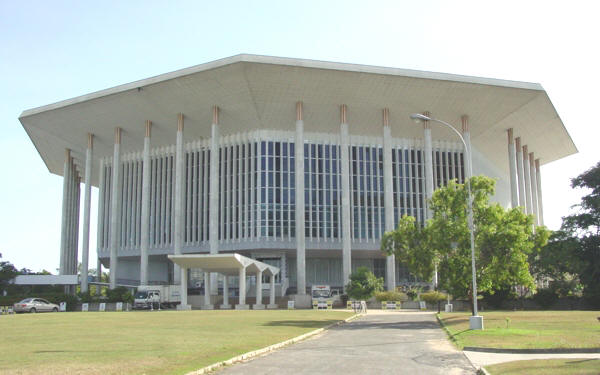
'China, a benign and sincere friend of Sri Lanka' -
Sri
Lanka Foreign Minister Lakshman Kadirgamar, 9 April 2005
n
China – Sri Lanka – India: Matrix
"China is all set to drop anchor at India's southern doorstep. An
agreement has been finalized between Sri Lanka and China under which
the latter will participate in the development of a port project at
Hambantota on the island's south coast.”
China moves into India's back yard Sudha Ramachandran in Asia
Times, 13 March 2007
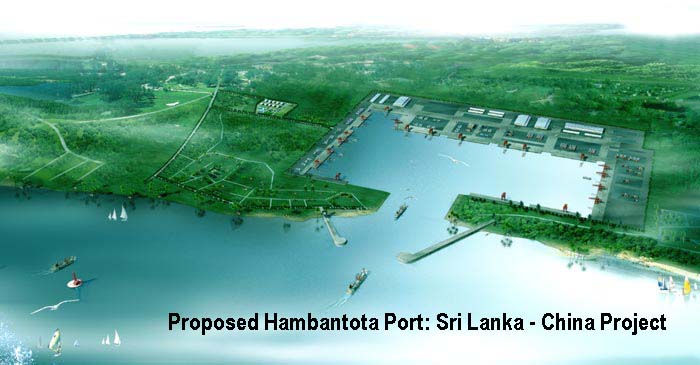
n
Hambantota – a Pearl in China’s String of Pearls
“…Chinese role in the Hambantota project is not just about
influence in Sri Lanka. .. The Hambantota port project is the latest
in a series of steps that China has taken in recent years to
consolidate its access to the Indian Ocean and to secure sea lanes
through which its energy supplies are transported. It has adopted
what analysts describe as a "string of pearls" strategy, building
strategic relationships with countries along sea lanes from the
Middle East to the South China Sea. “ China moves into India's
back yard..” Sudha Ramachandran in Asia Times, 13 March 2007
n
…international frame of the struggle of Tamil Eelam for freedom - the harsh
reality…
“ the harsh political reality is that, on the one hand, the US is
mindful that it was after all President Jayawardene's 'growing
togetherness' with the US which led to New Delhi's support of the
Tamil militant movement in the early 1980s. At that time the US kept
its oars in Tamil waters with efforts such as hoisting the Eelam
flag in the State of Massachusetts. Today, the same US continues to
speak of the 'legitimate aspirations' of the Tamil people.
On the other hand, New Delhi has no desire to lose its ability to
play the 'Tamil card' to keep Sri Lanka in line in the years to come
- even after the successful annihilation of Velupillai Pirabakaran
and the weakening of the LTTE. And so New Delhi too proclaims ad
nauseam that they are concerned to secure the 'legitimate
aspirations' of the Tamil people. Additionally it builds its own
network amongst dissident Tamils both in Sri Lanka and abroad to
propagate its interests.”
Black
Pebbles & White Pebbles - Nadesan Satyendra 12 September 2006
n
but…what ‘should’ be the ‘legitimate’ aspirations of the people of Tamil
Eelam?...
“ And to those in the international community who continue to
speak of their willingness to recognise the 'legitimate aspirations'
of the Tamil people… the time has come to reiterate that which
Gandhian leader S.J.V.Chelvanayagam declared 32 years ago and say
that it is the legitimate aspiration of the Tamil people to be free
from alien Sinhala rule. Does the international community agree that
the aspiration of the Tamil people to be free from alien Sinhala
rule is a 'legitimate' aspiration? … If it does not, has not the
time come for the international community to explain to the people
of Tamil Eelam its reasons for insisting that the Tamil people be
ruled by a permanent Sinhala majority within the confines of a
single state - with a Sinhala army occupying the Tamil homeland? “
The Charge is Genocide, the Struggle is for Freedom, Nadesan
Satyendra, 14 August 2007
n
…the refusal to recognise the justice of the Tamil Eelam struggle for
freedom…
"... exposes
the harsh reality of the impact of the uneasy balance of power in
the Indian Ocean… “… US and India may find common cause in
annihilating the Tamil Eelam Struggle for freedom … but they seek to
do it in such a way that thereafter each of them may successfully
jockey (against each other) for position and influence in the Indian
Ocean region…”
Black Pebbles & White Pebbles - Nadesan Satyendra 12 September 2006
n
It is true that geography plays a silent and important role in the affairs
of nations… but any foreign force can have its way in a Tamil Eelam only if its
people are divided & politically obfuscated…
“…Today it is clear beyond all reasonable doubt that India and
the US-UK-Japan Bloc are trying to influence and manage Sri Lanka's
peace process to promote and consolidate their respective strategic
and economic interests... We already hear fools (and there are many
of the educated variety among Tamils) declaring that we should
swallow our pride and yield to the dictates of the world's sole
super power, that the US would bomb the Vanni back to the stone age
if the LTTE does not toe the line. Any foreign force can have its
way in a country only if its people are divided, politically
obfuscated and are irredeemably sunk in political stupor…”
D.Sivaram in The Folly of Eelam Punditry , May 2003
n … The creeping
intellectual/political barrenness (amongst Tamils) should be stopped
without further delay…
"The creeping intellectual/political barrenness (amongst Tamils)
should be stopped without further delay. LTTE officials too should
stop making pedestrian, boringly predictable utterances on public
forums and, instead, make every endeavour to stir the people's
reason, intellectual curiosity, their sense of community, their
imagination and their intellectual fervour. This is the only way
forward to decisively break the vicious circle of political
obfuscation by which our people are deeply but blissfully afflicted
today."
D.Sivaram in The Folly of Eelam Punditry , May 2003
n … the strength of an aspiration
towards liberty, cannot be estimated in terms of so many guns, such and
such laws…
"..A feeling or a thought ...the aspiration towards liberty,
cannot be estimated in the terms of concrete power, in so many
fighting men, so many armed police, so many guns, so many prisons,
such and such laws, ukases, and executive powers. But such feelings
and thoughts are more powerful than fighting men and guns and
prisons and laws and ukases. Their beginnings are feeble, their end
is mighty. But of despotic repression the beginnings are mighty, the
end is feeble...".
Sri Aurobindo in Bande Mataram, 1907
n
…and the demand for national self determination is a struggle for democracy
"...Demands for 'national selfdetermination' are in one sense, a
struggle for a higher form of democracy...It must then be recognised
that 'post-colonial liberation movements', far from being inherently
'undemocratic', 'subversive', 'terrorist' ad infinitum, are often
the most effective medium for democratic assertion by social groups
who have been deprived of equal citizenship rights, who have been
subjected to denial and state oppression..."
Sumantra Bose
in Reconceptualising State, Nation and Sovereignty, 1994
n
The Tamil Eelam Struggle for Freedom is just – and it is lawful…
"...The Tamil struggle for freedom is just because it arose in
response to decades of ever widening and deepening oppressive alien
Sinhala rule. It is lawful because every people have the right to
freely choose their political status - and no people may seek to
rule another. It is lawful because Tamil sovereignty which had lain
dormant during the period of successive British and Sinhala rule,
was resuscitated with the break in legal continuity in 1972. The
Tamil struggle for freedom is principled because the Tamil people do
not deny the existence of the Sinhala nation but seek to associate
with it freely and on equal terms. .. ”
Nadesan
Satyendra in Power and Principle, 1994
n
Velupillai Pirabaharan, Leader of Tamil Eelam, was right when he declared in
1992…
"...It is the Sri Lanka government which has failed to learn the
lessons from the emergence of the struggles for self determination
in several parts of the globe and the innovative structural changes
that have taken place... We are not chauvinists. Neither are we
lovers of violence enchanted with war. We do not regard the Sinhala
people as our opponents or as our enemies. We recognise the Sinhala
nation. We accord a place of dignity for the culture and heritage of
the Sinhala people. We have no desire to interfere in any way with
the national life of the Sinhala people or with their freedom and
independence. We, the Tamil people, desire to live in our own
historic homeland as an independent nation, in peace, in freedom and
with dignity.." Message
to International Federation of Tamils Conference UK 1992
n
But, it is a vain dream to suppose…
"..It is a vain dream to suppose that what other nations have won
by struggle and battle, by suffering and tears of blood, we shall be
allowed to accomplish easily, without terrible sacrifices, merely by
spending the ink of the journalist and petition framer and the
breath of the orator..."
Sri Aurobindo in Bande Mataram, 1907 quoted in The Charge is
Genocide, the Struggle is for Freedom, Nadesan Satyendra, 14 August
2007
n “இலட்சியத்தால் ஒன்றுபட்ட,
எழுச்சி கொண்ட, மக்களை எந்த ஒரு சக்தியாலும் ஒடுக்கிவிட முடியாது” -
Velupillai Pirabaharan,
Leader of Tamil Eelam
n
Further Reading at www.tamilnation.org
International Frame of the Tamil Eelam Struggle for Freedom
http://www.tamilnation.org/intframe/tamileelam/index.htm
n
Indian Ocean Region
http://www.tamilnation.org/intframe/indian_ocean/index.htm
n
Australia
http://www.tamilnation.org/intframe/australia/index.htm
n
Canada
http://www.tamilnation.org/intframe/canada/index.htm
n
China
http://www.tamilnation.org/intframe/china/index.htm
n
Commonwealth
http://www.tamilnation.org/intframe/chogm/index.htm
n
European Union
http://www.tamilnation.org/intframe/eu/index.htm
n
India
http://www.tamilnation.org/intframe/india/index.htm
n
Japan
http://www.tamilnation.org/intframe/jp/index.htm
n
South Africa
http://www.tamilnation.org/diaspora/southafrica.htm
n
Switzerland
http://www.tamilnation.org/intframe/switzerland/index.htm
n
United Kingdom
http://www.tamilnation.org/intframe/uk/index.htm
n
United States
http://www.tamilnation.org/intframe/us/index.htm
n
International Relations in an Emerging Multi Lateral World
http://www.tamilnation.org/intframe/index.htm
Vannakkam
|